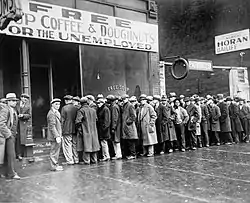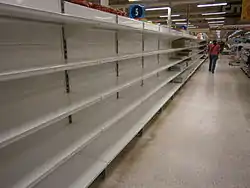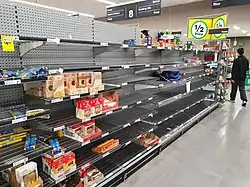Shortage
In economics, a shortage or excess demand is a situation in which the demand for a product or service exceeds its supply in a market. It is the opposite of an excess supply (surplus).


Definitions
In a perfect market (one that matches a simple microeconomic model), an excess of demand will prompt sellers to increase prices until demand at that price matches the available supply, establishing market equilibrium[1]. In economic terminology, a shortage occurs when for some reason (such as government intervention, or decisions by sellers not to raise prices) the price does not rise to reach equilibrium. In this circumstance, buyers want to purchase more at the market price than the quantity of the good or service that is available, and some non-price mechanism (such as "first come, first served" or a lottery) determines which buyers are served. So in a perfect market the only thing that can cause a shortage is price.
In common use, the term "shortage" may refer to a situation where most people are unable to find a desired good at an affordable price, especially where supply problems have increased the price. "Market clearing" happens when all buyers and sellers willing to transact at the prevailing price are able to find partners. There are almost always willing buyers at a lower-than-market-clearing price; the narrower technical definition doesn't consider failure to serve this demand as a "shortage", even if it would be described that way in a social or political context (which the simple model of supply and demand does not attempt to encompass).
Causes
Shortages (in the technical sense) may be caused for the following:
- Price ceilings, a type of price control which involves a government-imposed limit on the price of a product service.
- Anti-price gouging laws.
- Government ban on the sale of a product or service, such as prostitution or certain recreational drugs.
- Decisions by suppliers not to raise prices, for example to maintain friendly relationships with potential future customers during a supply disruption.
- Artificial scarcity
Effects
Decisions which result in a below-market-clearing price help some people and hurt others. In this case, shortages may be accepted because they theoretically enable a certain portion of the population to purchase a product that they couldn't afford at the market-clearing price. The cost is to those who are willing to pay for a product and either can't, or experience greater difficulty in doing so.
In the case of government intervention in the market, there is always a trade-off with positive and negative effects. For example, a price ceiling may cause a shortage, but it will also enable a certain percentage of the population to purchase a product that they couldn't afford at market costs. Economic shortages caused by higher transaction costs and opportunity costs (e.g., in the form of lost time) also mean that the distribution process is wasteful. Both of these factors contribute to a decrease in aggregate wealth.
Shortages may cause:
- Black (illegal) and Grey (unregulated) markets in which products that are unavailable in conventional markets are sold, or in which products with excess demand are sold at higher prices than in the conventional market.
- Artificial controls of demand, such as time (such as waiting in line) and rationing.
- Non-monetary bargaining methods, such as time (for example queuing), nepotism, or even violence.
- Panic buying
- Price discrimination.
- The inability to purchase a product, and subsequent forced saving.
Examples

Many regions around the world have experienced shortages in the past.
- Food shortages have occurred in the United States during the Great Depression.[2]
- Rationing in the United Kingdom and the United States occurred mainly during and after the world wars
- Potato shortages in the Netherlands triggered the 1917 Potato riots.[3][4]
- From 1920 to 1933 during prohibition in the United States, the creation of a black market for liquor was created due to the low supply of alcoholic beverages.
- During the 1973 oil crisis, during which long lines and rationing was used to control demand.
- In the former Soviet Union during the 1980s, prices were artificially low by fiat (i.e., high prices were outlawed). Soviet citizens waited in line for various price-controlled goods and services such as cars, apartments, or some types of clothing. From the point of view of those waiting in line, such goods were in perpetual "short supply"; some of them were willing and able to pay more than the official price ceiling, but were legally prohibited from doing so. This method for determining the allocation of goods in short supply is known as "rationing".
- From the mid-2000s through the 2010s, shortages in Venezuela occurred, due to the Venezuelan government's economic policies;[5] such as relying on foreign imports while creating strict foreign exchange controls, put price controls in place and having expropriations result with lower domestic production. As a result of such shortages, Venezuelans had to search for products, wait in lines for hours and rationing was initiated, with the government allowing the purchase of a certain amount of products when it's available, through fingerprint recognition.[6][7][8]
- Shortages in Sudan sparked a revolution in 2019 which ended President Omar al-Bashir's 30-year rule. They continued into 2020.[9]
- Panic buying due to the COVID-19 pandemic caused food and product shortages around the world.[10] One of the innovations that came out of this was the implementation of applications that alerted consumers when scarce items were back in stock.[11]
Shortages and "longages"
Garrett Hardin emphasised that a shortage of supply can just as well be viewed as a "longage" of demand. For instance, a shortage of food can just as well be called a longage of people (overpopulation). By looking at it from this view, he felt the problem could be better dealt with.[12]
Labour shortage
In its narrowest definition, a labour shortage is an economic condition in which employers believe there are insufficient qualified candidates (employees) to fill the marketplace demands for employment at a wage that is mostly employer-determined. Such a condition is sometimes referred to by economists as "an insufficiency in the labour force." An ageing population and a contracting workforce and a birth dearth may curb U.S. economic expansion for several decades, for example.[13]
Wage factors
Wage levels have been suggested as one way to measure a labour shortage. However, that often does not match people's common perceptions. For example, if wages alone are the best measure of labour shortages, then that would imply that doctors, instead of farm workers, should be imported because doctors are far more expensive than farm workers. However, there are institutionally-imposed limits on the number of doctors that are allowed to be licensed. If foreign migrant workers were not allowed into a nation, farm wages may go up but probably not enough to approach the wages of doctors.
The Atlantic slave trade (which originated in the early 17th century but ended by the early 19th century) was said to have originated from perceived shortages of agricultural labour in the Americas (particularly in the Southern United States). It was thought that bringing African labor was the only means of malaria resistance available at the time.[14] Ironically, malaria seems to itself have been introduced to the "New World" via the slave trade.[15]
See also
References
- Tucker (2014) Economics Today
- "Depression and the Struggle for Survival". Library of Congress. Retrieved 30 March 2020.
The Great Depression of the 1930s hit Mexican immigrants especially hard. Along with the job crisis and food shortages that affected all U.S. workers, Mexicans and Mexican Americans had to face an additional threat: deportation.
- "Potato eaters shot". International Institute of Social History. 7 July 1917.
- "Potato riots in Amsterdam". Bendigo Advertiser. 6 July 1917. p. 7 – via National Library of Australia.
- "Venezuela seizes warehouses packed with medical goods, food". Reuters. 2014-10-24. Retrieved 2015-12-07.
- "Why are Venezuelans posting pictures of empty shelves?". BBC. 8 January 2015. Retrieved 10 January 2015.
- Cawthorne, Andrew (21 January 2015). "In shortages-hit Venezuela, lining up becomes a profession". Reuters. Retrieved 17 June 2015.
- Schaefer Muñoz, Sara (22 October 2014). "Despite Riches, Venezuela Starts Food Rationing; Government Rolls Out Fingerprint Scanners to Limit Purchases of Basic Goods; 'How Is it Possible We've Gotten to This Extreme'". Dow Jones & Company Inc. The Wall Street Journal. Retrieved 11 November 2014.
- "Sudan: Frustration grows over fuel, bread shortages". Al Jazeera. 11 March 2020.
- Tkyo, Kelly (29 February 2020). "Coronavirus fears empty store shelves of toilet paper, bottled water, masks as shoppers stock up". USA Today.
- "It Arrived".
- Video Interview with Garrett Hardin: Longages and Overpopulation Predictions Educational Communications program 803, 1990
- Shrinking labour force may curb U.S. expansion for two decades
- "As American as…Plasmodium vivax?"
- "UCI: New World malaria linked to slave trade."
- Kornai, János, Socialist economy, Princeton University Press, 1992, ISBN 0-691-00393-9
- Kornai, János, Economics of Shortage, Amsterdam: North Holland Press, Volume A, p. 27; Volume B, p. 196 .
- Gomulka, Stanislaw: Kornai's Soft Budget Constraint and the Shortage Phenomenon: A Criticism and Restatement, in: Economics of Planning, Vol. 19. 1985. No. 1.
- Planning Shortage and Transformation. Essays in Honor of Janos Kornai, Cambridge, Massachusetts: MIT Press, 2000
- Myant, Martin; Drahokoupil, Jan (2010), Transition Economies: Political Economy in Russia, Eastern Europe, and Central Asia, Wiley-Blackwell, ISBN 978-0-470-59619-7
External links
| Look up shortage in Wiktionary, the free dictionary. |
- János Kornai Home Page at Harvard University
- János Kornai Home Page at Collegium Budapest
- Part 1 and Part 2 of COMPARING AND ASSESSING ECONOMIC SYSTEMS, Shortage and Inflation: The Phenomenon, PPT (PowerPoint file presentation) at West Virginia University
- János Kornai 'The Soft Budget Constraint'
- David Lipton and Jeffrey Sachs 'The Consequences of Central Planning in Eastern Europe'
- On overview and critique of Kornai's account can be found in Myant, Martin; Jan Drahokoupil (2010). Transition Economies: Political Economy in Russia, Eastern Europe, and Central Asia. Hoboken, New Jersey: Wiley-Blackwell. pp. 19–23. ISBN 978-0-470-59619-7.
- Planning For The Looming Labor Shortage - A Supply Chain Perspective by HK Systems
- "America's New Immigrant Entrepreneurs" - A Duke University Study
- Criticism of high-tech shortage claims
- Disputation of High-tech Labor Shortage by Dr. Matloff
- RAND Study on Alleged Shortage of Scientists
- Shortage of skilled workers knocks red tape off top of business constraints league table - Grant Thornton IBR
- The Real Science Gap - "It's not insufficient schooling or a shortage of scientists. It’s a lack of job opportunities."